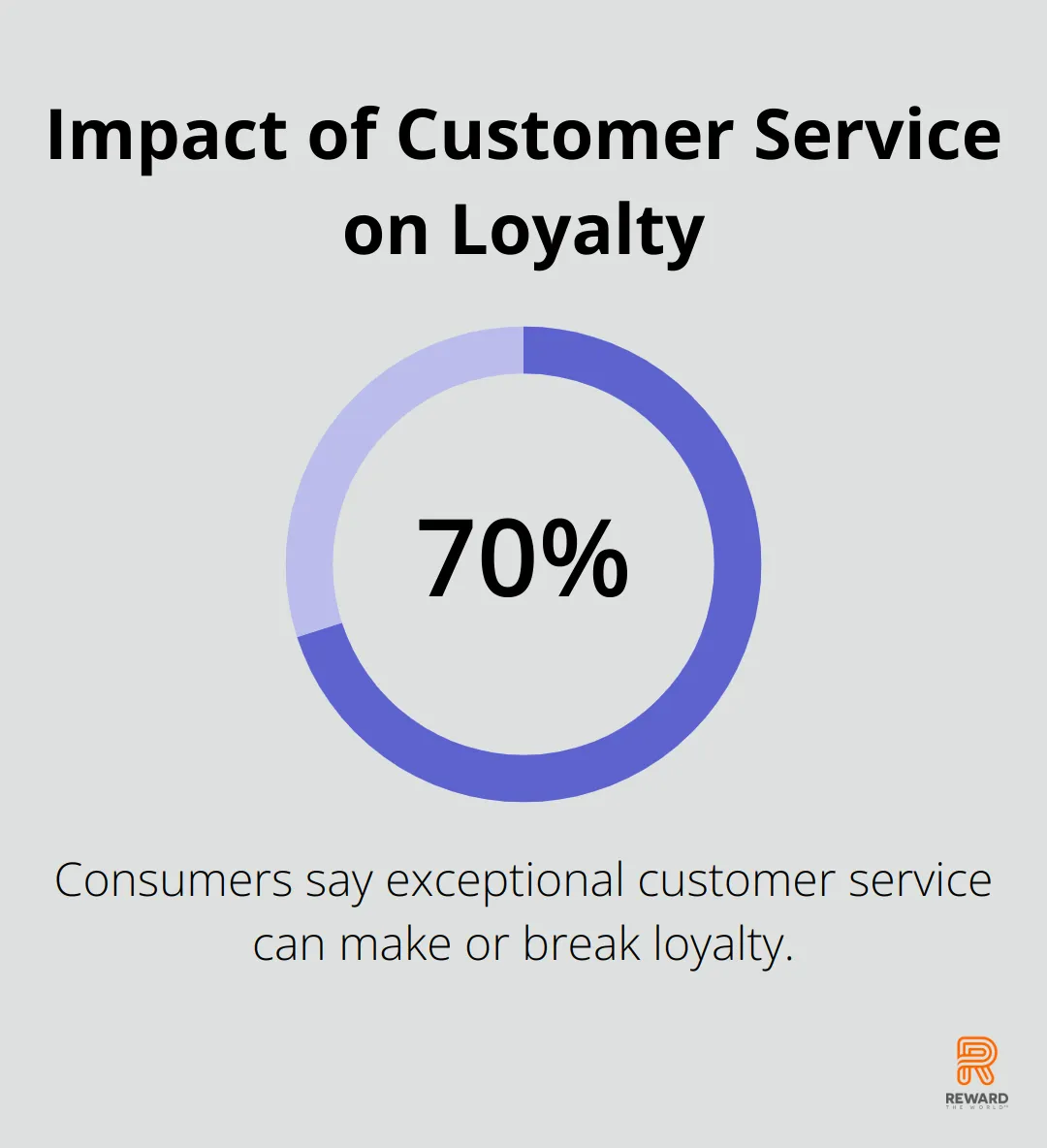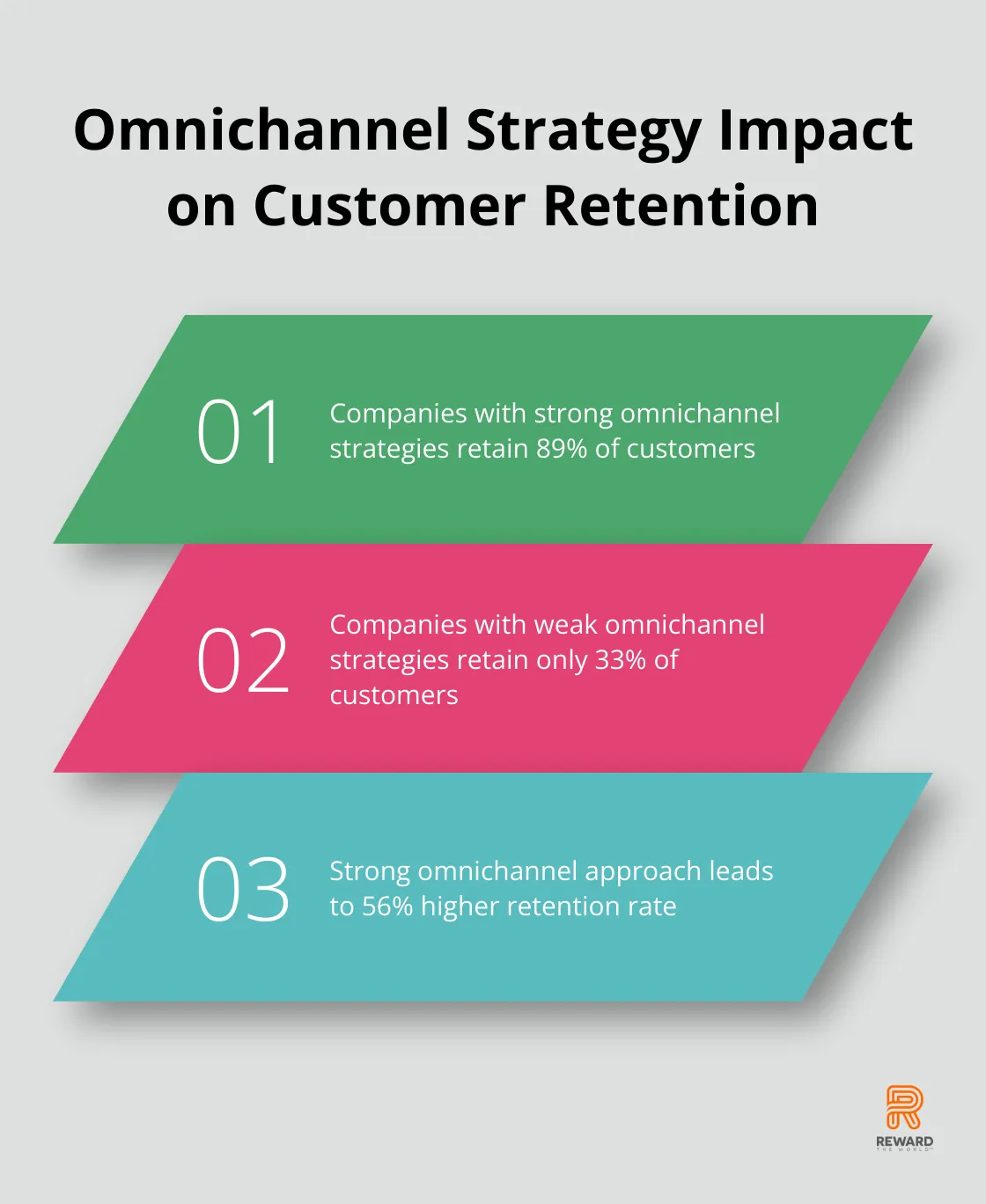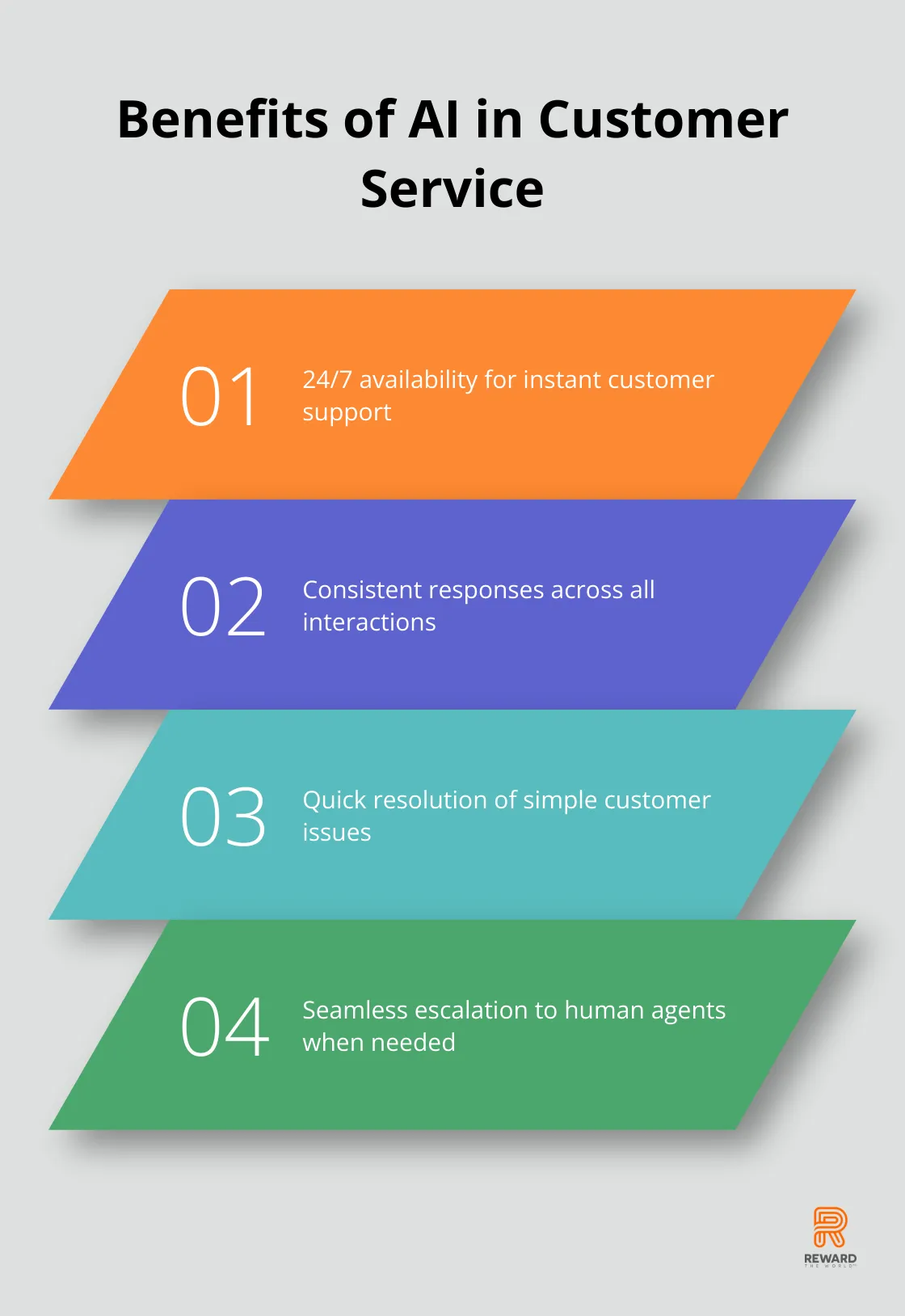
Customer service is the backbone of successful loyalty programs. It’s not just about offering rewards; it’s about creating meaningful connections with customers.
At Reward the World, we’ve seen firsthand how exceptional service can transform a good loyalty program into a great one. From personalized experiences to AI chatbots, the tools and strategies for enhancing customer service are evolving rapidly.
In this post, we’ll explore how to elevate your loyalty program’s customer service to new heights.
Why Customer Service Makes or Breaks Loyalty Programs
The Power of Retention
Customer service stands as the cornerstone of successful loyalty programs. Bain’s research over 10 years has identified five themes that describe the progress and challenges of earning customers’ advocacy in an increasingly digital experience. This underscores the critical role of keeping customers satisfied and engaged within loyalty programs.
Word-of-Mouth: A Double-Edged Sword
Excellent customer service creates brand advocates. A study by American Express found that 70% of consumers say that exceptional customer service can make or break customer loyalty. This word-of-mouth effect (both positive and negative) significantly impacts a program’s success.

Turning Challenges into Triumphs
Every customer service interaction presents an opportunity to strengthen brand relationships. Harvard Business Review found that customers who had a problem resolved quickly and efficiently showed more loyalty than those who never experienced issues. This counterintuitive finding highlights the potential of viewing customer service as a strategic asset rather than a cost center.
The Human Touch in a Digital World
Empathy in customer service can transform experiences. PwC reports that 59% of consumers feel companies have lost touch with the human element of customer experience. Loyalty programs can create emotional connections with their members by training representatives to be empathetic and understanding, thus fostering long-term loyalty.
Personalization: The Key to Customer Hearts
In our data-driven era, customers expect tailored experiences. Epsilon’s study found that 80% of consumers are more likely to make a purchase when brands offer personalized experiences. For loyalty programs, this translates to using customer data to provide customized recommendations, rewards, and communication.
Customer service transcends problem-solving; it creates experiences that keep customers coming back. Exceptional customer service boosts success rates, increases satisfaction, and drives business growth for loyalty programs. As we move forward, we’ll explore specific strategies to elevate customer service within loyalty programs to new heights.
How Can We Revolutionize Customer Service in Loyalty Programs?
Hyper-Personalization: The New Frontier
One-size-fits-all service no longer cuts it. Today’s consumers demand tailored interactions at every touchpoint. A study by Epsilon revealed that 80% of consumers are more likely to purchase when brands offer personalized experiences.
To achieve this level of personalization:
- Use AI-powered analytics to predict customer preferences and behavior.
- Offer exclusive deals based on member activity (e.g., travel rewards for frequent flyers).
- Segment your audience and create customized communication strategies for each group.
This approach can lead to a 20% increase in customer satisfaction (according to McKinsey).
Omnichannel Excellence: Meet Customers Where They Are
Modern consumers switch between channels seamlessly and expect your service to do the same. Companies with omnichannel customer engagement strategies retain on average 89% of their customers, compared to 33% for companies with weak omnichannel strategies.

Try to:
- Implement a unified customer service platform that integrates all channels.
- Ensure consistent experiences across phone, email, chat, social media, and in-app support.
- Allow service representatives to access full customer histories regardless of contact method.
Innovative features like click-to-call from mobile apps or video chat support for complex issues can set your program apart in a crowded market.
Proactive Problem-Solving: Anticipate and Delight
Don’t wait for customers to report problems. Anticipate issues and address them preemptively. Use predictive analytics to identify potential pain points in the customer journey.
Examples include:
- Reaching out to members close to losing elite status with personalized offers.
- Sending friendly reminders about expiring rewards with redemption suggestions.
This proactive approach helps customers get the most out of their service and demonstrates that you value your members’ loyalty.
Empowering Customer Service Representatives
Your front-line staff plays a crucial role in delivering exceptional service. Invest in their training and provide them with the tools they need to succeed.
Key strategies include:
- Comprehensive product knowledge training.
- Empowerment to make decisions and resolve issues on the spot.
- Regular feedback and performance reviews.
- Access to up-to-date customer information and loyalty program details.
Well-trained and empowered representatives can turn potentially negative experiences into positive ones, fostering long-term loyalty.
Leveraging AI and Chatbots for 24/7 Support
In today’s fast-paced world, customers expect round-the-clock support. AI-powered chatbots can provide instant responses to common queries, freeing up human agents to handle more complex issues.
Benefits of AI in customer service:
- 24/7 availability
- Consistent responses
- Quick resolution of simple issues
- Seamless escalation to human agents when needed

As we move forward, the next chapter will explore how technology can further enhance customer service in loyalty programs, from advanced data analytics to mobile app integration.
Here’s the modified chapter:
How Technology Revolutionizes Loyalty Program Customer Service
Technology reshapes customer service in loyalty programs. From AI-powered solutions to data-driven insights, these innovations transform how businesses interact with their members.
AI Transforms Customer Support
Artificial Intelligence now plays a central role in customer service. AI agents are replacing legacy chatbots, offering more advanced capabilities. There’s an opportunity for more intuitive AI tools to close customer service gaps.
These AI assistants handle routine inquiries, which allows human agents to focus on complex issues. A loyalty program member can ask about their point balance, redeem rewards, or get program information instantly, any time of day.
AI also personalizes interactions. These systems offer tailored recommendations and solutions by analyzing past behavior and preferences. This personalization significantly boosts customer satisfaction and engagement.
Predictive Analytics Powers Proactive Service
Data analytics transforms customer service from reactive to proactive. Businesses predict issues before they arise and take preventive action by analyzing vast amounts of customer data.
For example, if a loyalty program member typically redeems points for travel rewards but hasn’t done so recently, the system could trigger a personalized offer or check-in message. This proactive approach prevents potential disengagement and shows members that the program values their participation.
Gartner identified the top 10 data and analytics (D&A) trends for 2023 that can guide D&A leaders to create new sources of value. This underscores the importance of data for predictive, personalized customer service.
Self-Service Options Empower Customers
Many customers prefer to find answers on their own. Self-service portals and comprehensive knowledge bases satisfy this preference while reducing the load on customer service teams.
A well-designed self-service portal allows members to manage their accounts, track rewards, and find answers to common questions without contacting support.
It’s essential to strike a balance. Self-service options should complement, not replace, human support. Customers should easily escalate to a human agent when needed.
Mobile Apps Provide Instant Support
In our smartphone-centric world, mobile apps become the go-to platform for customer interactions. A well-designed loyalty program app offers instant support, real-time updates, and seamless program management.
Mobile apps send push notifications about new rewards, expiring points, or exclusive offers. They also integrate chatbots for instant support and provide easy access to account information and reward redemption.
Businesses that routinely interact with their consumers via a mobile app usually have more brand loyalty and client retention. Your app makes you visible and accessible to your customers. This highlights the importance of investing in a robust, user-friendly mobile app for your loyalty program.
Final Thoughts
Customer service defines successful loyalty programs. Personalization, omnichannel support, and proactive problem-solving enhance customer experiences. Technology transforms interactions, with AI chatbots, predictive analytics, and mobile apps leading the way. The future promises hyper-personalized experiences powered by advanced AI and data analytics.
Human representatives will handle complex, emotionally nuanced interactions. Businesses must stay attuned to emerging technologies and shifting customer preferences. Regular evaluation of customer feedback and service metrics remains essential for maintaining a competitive edge.
Reward the World offers businesses tools to create personalized, engaging experiences for their customers. Our platform includes features like instant reward delivery and robust analytics. Companies that prioritize customer service in their loyalty programs will thrive, creating lasting relationships that benefit both businesses and customers.
